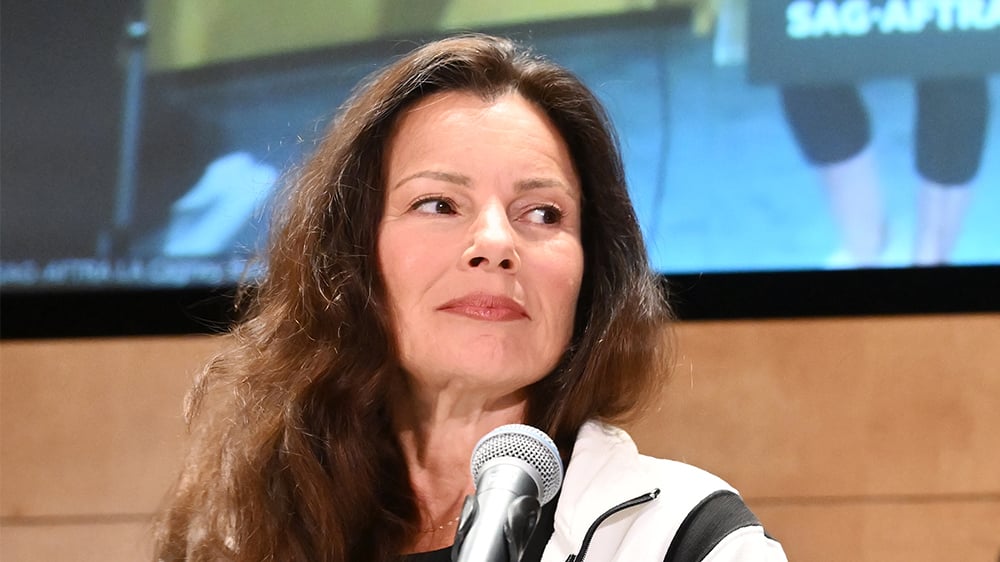As the clock ticked toward midnight on July 12, SAG-AFTRA president Fran Drescher addressed the group of negotiators from the major studios.
“You’re sitting on the wrong side of history,” she told them. “Shame on you.”
It had been clear for some time that Drescher’s union would go on strike. A final day of talks with two federal mediators had done nothing to bridge the gaps between the two sides. Drescher’s speech served as the exclamation point — a dramatic flourish from a born performer — casting the dispute over business models and residual formulas in Manichean terms.
Best known for her 1990s sitcom “The Nanny,” Drescher has now taken a starring role in Hollywood’s “hot labor summer.” On Thursday, she led her union of 160,000 members into its first TV and film strike in 43 years. It is also the first “double strike” — with writers and actors together on the picket lines — since 1960, when Ronald Reagan led the Screen Actors Guild.
Drescher had no labor experience before being narrowly elected president two years ago. Many of her opponents dismissed her as a figurehead with a loose grasp of union issues and unconventional notions about health, wellness and vaccines.
But since her election, she has brokered a tentative peace between the guild’s warring internal factions and led the union to a near-unanimous vote to authorise a strike.
“It’s pretty amazing what Fran has done,” said Shaan Sharma, a member of the negotiating committee. “She has brought us all together.”
Love Film & TV?
Get your daily dose of everything happening in music, film and TV in Australia and abroad.
RELATED CONTENT: Fran Drescher Delivered the Performance of a Lifetime as SAG-AFTRA President
At a press conference on Thursday, Drescher unloaded on the Alliance of Motion Picture and Television Producers, mixing moral outrage with humour and a bit of Yiddish.
At one point, she said she thought negotiations were going well. “But then,” she added, “what we ultimately received from them was what my Mom would call a lek and a schmeck” — a lick and a sniff, or not much at all.
Pursuing the historical theme, she also drew an analogy between the strike and the French Revolution.
“Eventually, the people break down the gates of Versailles,” she said. “And then it’s over. We’re at that moment right now.”
She then sat for a long series of TV interviews. In one, she was asked about criticism she received for being photographed with Kim Kardashian at a Dolce & Gabbana event in Italy over the weekend, as the strike deadline approached in Los Angeles.
She defended it — “I was working there” — and blamed the kerfuffle on the AMPTP, which she said was “trying to create clickbait.”
“That’s a low blow that should be beneath them,” she told Variety.
Between each interview, she checked her messages, and was surprised how many people had already seen her speech and were sending kudos.
“Could my mother have seen it?” she asked a union staffer. “Oh my gosh, we gotta get a clip for Sylvia.”
Drescher is both the union president and the chair of the negotiation committee — the only leader of the above-the-line guilds to hold both positions.
She was also the key person behind her union’s most unconventional proposal — a revenue-sharing formula that would give performers a percentage of the economic value of successful shows on streaming platforms.
Drescher told Variety that the proposal is essential because streaming has upended the traditional model in entertainment.
“We’re supposed to get revenue sharing, but it’s not there anymore,” she said. “So we have to go here.”
The economic value of a show is hard to calculate, in part because the streamers keep viewership metrics a secret and also because they have different business models. SAG-AFTRA proposed using estimates of value from private research firm Parrot Analytics, which draws on indicators like Google searches and Twitter mentions.
The studios have dismissed that approach as unreliable. While union leaders have said they are “flexible” about how the figure is calculated, they are adamant that some form of performance-based pay formula is essential to ending the strike.
“This has to be part of whatever deal they want us to agree to,” Sharma said.
Drescher argued that the issue — which has also been raised by the Writers Guild of America — is at the core of Hollywood’s labor unrest.
“We’re not the only above-the-liners that are complaining about this,” she said. “This is why everybody is in an uproar.”
From Variety US































